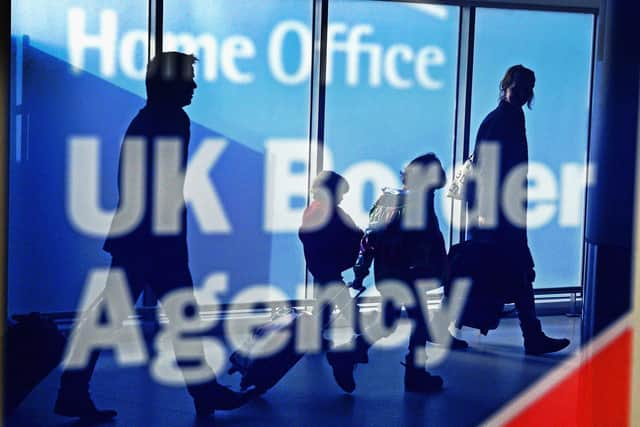Think migrants just live off the state? Here are 41,500 reasons why the opposite is true
As the general election approaches, immigration's impact on the welfare system is at the heart of the political battlefield. With high net figures in 2023, we are witnessing a complex dance of political promises: tightening immigration controls, restricting access to services, and ‘taxing mass immigration’.
Despite heated discussions, many know little about immigrants' actual fiscal contributions, including the costs they bear to work, study, or unite their families in the UK. This gap in evidence leaves a crucial aspect of the debate under-examined, highlighting the need for more informed discussion.
Advertisement
Hide AdAdvertisement
Hide AdThe UK has some of the highest immigration fees in the world, far exceeding Australia, Canada, and Germany’s. Fees for work and visit visas, healthcare, and costs for citizenship applications, extensions and settlements soared in 2023 to fund public-sector pay increases. The cost of a limited-leave-to-remain visa, including the health surcharge, has increased by more than 500 per cent since 2014, with a skilled worker with a partner and two children paying around £41,500 to reside and work here.


Migrants pay double for NHS
The immigration health surcharge (IHS) is particularly striking. Introduced in 2015 at £200 per year per person, it was raised to £1,035 per adult in 2023. In 2022/23, IHS payments totalled over £1.7 billion, funding healthcare in the UK based on the estimated average cost of providing NHS services to migrants. Like UK citizens, most migrants contribute to the NHS through their taxes, yet they are also required to pay this hefty surcharge – a form of double taxation – for access to the same services.
A recent cross-parliamentary report shows the worst affected are migrants already struggling with the cost of living, including temporary migrants with ‘no recourse to public funds’ visas. High visa fees force people into debt, pushing more families into poverty.
If elected, the Conservatives intend to further increase immigration application fees for all visas by 25 per cent, remove the IHS discount for international students, require migrants to have a health check before traveling, and either increase the IHS or require migrants to hold private health insurance if they are considered likely to burden the NHS.
Imperial history continues
It’s unclear whether increasing immigration fees to fund public sector pay rises can be justified in legal terms. However, appropriating economic surpluses from migrant visa fees for citizens' benefit is not new. It reflects a particular relationship rooted in the UK's imperial history.
The resources that led to the creation of the welfare state and workers' rights in the UK significantly rested on rents and taxes extracted from colonies in the Global South. Even after independence, the wealth extracted continues to support these benefits, notably through labour migration from former colonies, which helped establish institutions like the NHS.
Recognising this history is crucial for better understanding the stories we are told about the welfare state and the deeper inequalities it represents. Despite being portrayed as a burden on finite resources, migrants are, in reality, integral to the functioning of the systems they’re accused of exploiting. A historically informed debate on immigration is essential to encourage people, regardless of their legal statuses as citizens and migrants, to challenge the cost of austerity politics on society as a whole.
İdil Akıncı-Pérez is a migrant academic at the University of Edinburgh, researching the role of immigration and citizenship policy in global inequalities
Comments
Want to join the conversation? Please or to comment on this article.